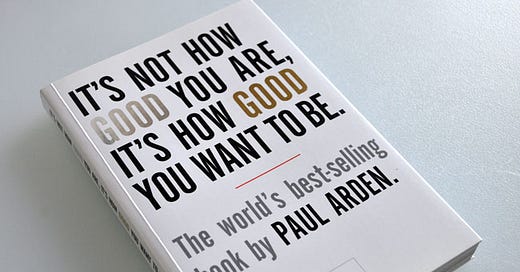This book taught me a lot about the world, marketing, but especially about myself. With direct sentences, diverse images, and some common wisdom, Paul Arden shows us the power of good publicity.
When searching for who Paul Arden was, the mystery of the author’s obsession with publicity is easily solved. His entire career was dedicated to advertising—from turning British Airways into the favorite airline to creating his own company, Arden, Sutherland-Dodd, and beginning a new career as a director of commercials. In 2003, he combined his love of photography with his knowledge of advertising and published It’s Not How Good You Are, It’s How Good You Want to Be.
I found out about this book through one of those reels with different suggestions, and I can officially say that I don’t judge a book by its cover, but I do by its title. I got really excited and curious about the content, but the second I opened it, the excitement turned into frustration and the curiosity into anger. It felt like I was reading the advertisement section in a newspaper. I felt ripped off, and I didn’t even buy the book. Every second I spent with it in my hands felt wasted, every minute a lifetime, and all my brain could think was, “Why did I want to read this book in the first place?” and “Why the hell didn’t I check others' opinions before adding it to my wish list?” The only concrete conclusion I could reach is that Arden was, in fact, an advertising genius. This book has been sold as a self-help book when it was clearly meant for people in his field. It was sold as a best-seller when it was HIS best-seller (note that he only has three books), and, what angered me the most, it was sold as a book when it’s really just a collection of Pinterest-style inspirational quotes. So congrats, Paul—you fooled me too.
Even though I didn’t get anything useful from the actual book, or even gain an understanding of what the book is truly about, it made me think about how the topic of “being better” is so deeply rooted in our brains to the point where we are led to believe that we need to be in constant improvement, that something is wrong and needs change, to the point that we buy Paul Arden’s book on the topic It’s Not How Good You Are, It’s How Good You Want to Be.
The self-help genre has been around for centuries, with early examples including religious and philosophical texts offering guidance on living a virtuous life. But this category has become one of the fastest-growing nonfiction genres, especially in the last decade, with books like How to Win Friends and Influence People by Dale Carnegie (1936) and The Power of Positive Thinking by Norman Vincent Peale (1952). This growth can be attributed to various factors. I believe it begins with the rise of e-books, audiobooks, and online platforms, which have made it easier, cheaper, and faster to access any book. The interest in the self-improvement category itself comes, in my opinion, from the reduced stigma around mental health, turning this topic into something widely discussed. In today’s fast-paced life, with economic instability and social pressures, the need for self-help has become more prominent. This is followed by the growing trend toward lifelong learning and self-improvement, driven by a competitive job market and the pursuit of personal fulfillment—a trend also popular on social media, where platforms like YouTube, Instagram, and podcasts focus primarily on this theme, each tailored to different niches. But are we consuming it in the right way? Are we taking in the actual knowledge and putting it into practice? Or are we using it to tell ourselves we aren’t good enough, using it to compare ourselves to an unrealistic ideal?
As a consumer myself, I can give plenty of examples where this content has boosted my self-discovery, fed my curiosity, and, most importantly, made me feel motivated to “be better.” But lately, I’ve been wondering—how many more videos do I have to watch? How many more books do I have to read? When will it be enough? And when will I reach the “better” that I so desperately seek? I guess this is the downside of self-improvement, or maybe it’s just one more phase, as most gurus like to call it. The constant pressure to achieve more can lead us to feel exhausted and overwhelmed, making it hard to enjoy the present moment. If we focus so much on future goals, when will we find time to enjoy the ones we’ve already reached? When will we have time to live in this moment? And when will I have time to smile, just because?
There are days I look back and don’t see any improvement. I’m still in the same place as when I started my journey. Honestly, I blame social media and most influencers who perpetuate the idea that this process involves big changes, that it will happen overnight. It becomes overwhelming—having the perfect morning routine, growing professionally, meditating, reading, trying new hobbies—while still enjoying your 20s, making meaningful friendships, living your best life, and enjoying youth. I owe Fernando Pessoa an apology for ignoring him during high school, for thinking he was dramatic, or maybe what I most feared has come true and I’ve become one of his personas. But I do believe it’s not easy to carry the weight and pain of being conscious.
If there’s one thing I’ve learned, it’s that it takes time—more steps back than forward. I will always want to improve something. Right now, it’s about being aware of how much I’ve grown and how exciting it was. But most importantly, it’s about enjoying this exact second, because deep down, I know I have the “ceifeira” in me while being fully conscious of it.






Love you ❤️